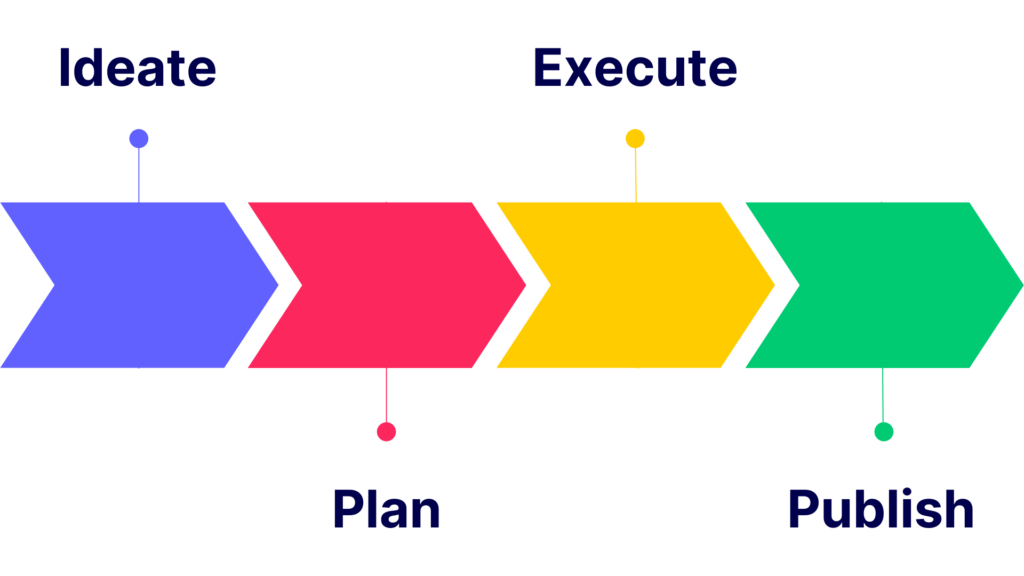What is a Project?
Before we delve into project management, it’s important to understand what constitutes a project. A project is a temporary endeavor undertaken to create a unique product, service, or result. It’s like embarking on a journey with a clear starting point and destination, complete with specific goals and milestones along the way.
The Process of Project Management
Project management is the art and science of leading a project from conception to completion. It involves four key phases:
- Ideate: This is where the project begins to take shape. You brainstorm ideas, define the project’s scope, and set initial goals.
- Plan: In this phase, you develop a detailed roadmap for your project. This includes breaking down tasks, allocating resources, and setting timelines.
- Execute: Here, you put your plans into action. This involves implementing strategies, monitoring progress, and making adjustments as needed.
- Publish: The final phase is about wrapping up the project, delivering the final product or result, and evaluating the project’s success.

This systematic approach ensures that every stage of your project, from initial concept to final delivery, is handled efficiently and effectively.
Let’s dive deeper in the process:
Understanding the four key components of project management is crucial for success:
1. Ideation: Sparking Creativity and Vision
The ideation phase is where your project takes its first breath. It involves:
- Brainstorming innovative ideas
- Defining the project’s scope and objectives
- Identifying potential challenges and opportunities
- Setting the foundation for the entire project journey
2. Planning: Crafting Your Project Roadmap
Planning is akin to creating a detailed blueprint for your project. It includes:
- Breaking down the project into manageable tasks
- Defining roles and responsibilities
- Allocating resources effectively
- Creating timelines and setting milestones
- Developing risk management strategies
A well-thought-out plan serves as your guide throughout the project lifecycle.
3. Execution: Turning Plans into Reality
Execution is where your plans come to life. This phase focuses on:
- Implementing strategies and completing tasks
- Monitoring progress and performance
- Making necessary adjustments to stay on track
- Managing team communication and collaboration
- Addressing challenges as they arise
Effective execution keeps your project moving towards its goals.
4. Publishing: Delivering and Evaluating Results
The publishing phase marks the culmination of your project efforts. It involves:
- Finalizing and delivering the project outcomes
- Gathering feedback from stakeholders
- Evaluating the project’s success against initial objectives
- Documenting lessons learned for future projects
- Celebrating achievements and recognizing team contributions
This phase ensures that your project not only reaches completion but also provides valuable insights for future endeavors.
Key Components of Project Management
Tasks: The Building Blocks of Success
At the core of any project are tasks – the individual actions that, when completed, lead to the project’s overall success. Breaking down your project into manageable tasks is crucial for maintaining clarity and progress.
Planning: Your Project Roadmap
Proper planning is akin to creating a detailed roadmap for your journey. It involves:
- Setting clear objectives
- Defining roles and responsibilities
- Allocating resources effectively
A well-thought-out plan serves as your guide throughout the project lifecycle.
Execution: Turning Plans into Reality
Execution is where your plans come to life. It’s about:
- Implementing your strategies
- Monitoring progress
- Making necessary adjustments along the way
Effective execution keeps your project on track and moving towards its goals.

The Benefits of Project Management
Implementing proper project management techniques can yield significant benefits:
- Increased Productivity: Organizations using project management methods can see up to a 28% reduction in budget waste.
- Improved Efficiency: Streamlined processes lead to faster completion times and better resource utilization.
- Reduced Stress: Clear plans and defined roles minimize confusion and workplace stress.
- Consistent Success: Meeting deadlines becomes more achievable with structured approaches.
Leveraging Project Management Tools
To translate these concepts into action, modern project management tools are invaluable. Platforms like monday.com offer a digital command center where you can:
- Break down projects into manageable tasks
- Assign responsibilities to team members
- Automate routine processes
- Track progress in real-time
These tools provide a centralized hub for all project-related information, making collaboration and management more efficient than ever.
Conclusion: Mastering the Art of Project Management
Understanding and implementing effective project management strategies is essential in today’s competitive business landscape. By focusing on careful planning, efficient execution, and leveraging the right tools, you can transform your work life and lead your projects to success.
Remember, project management is not just about completing tasks—it’s about creating a structured approach that turns your vision into reality. With these strategies and the right tools at your disposal, you’re well-equipped to tackle any project that comes your way.
Start implementing these project management principles today, and watch as your productivity soars and your stress levels decrease. Your journey from chaos to order begins now! If you need any further help, feel free to contact us.


